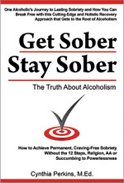Alcoholism and Depression
Alcoholism and depression usually go hand in hand. For some alcoholics the depression precedes the drinking, while for others it comes after. Sometimes it's difficult to know which one came first. Once one is set into action, they each can be the cause of the other or the perpetuator of one another.
Many people begin drinking to alleviate the feelings of depression, and although this seems to work initially, it ultimately makes the condition worse. On the other hand, once someone has been drinking for a long time, depression often sets in during times of abstinence.
Regardless of which came first, there is a very simple reason for their coexistence. Alcoholism, and addiction in general, share many of the same biochemical characteristics as depression. Each one is caused by a disruption, imbalance or malfunction in the neurotransmitters in the brain. In alcoholism, the primary neurotransmitters involved are dopamine and serotonin, as well as GABA, glutamate, norepinephrine and endorphins. In depression, the primary neurotransmitters involved are serotonin, dopamine, norepinephrine, GABA and endorphins.
Among other things, one of the primary jobs of neurotransmitters is to regulate our mood and provide us with feelings of well-being and pleasure. In both alcoholism and depression, the neurotransmitters are no longer performing their jobs adequately, which results in feelings of depression and/or cravings for a drink to boost the mood.
When you drink alcohol, it initially improves mood because it triggers an intense and large release of neurotransmitters that boost the mood. However, shortly thereafter the neurotransmitters then drop to a really low level and depression develops. Then you drink more to relieve the depression again.
The longer this cycle ensues the more damage that is done to the neurotransmitters. Both alcoholism and depression will progress and became entwined deeper together. The alcohol becomes both the poison and the temporary cure.
Another common condition found among alcoholics and people with depression and anxiety is Pyroluria. Pryoluria is a blood disorder, believed to be genetic, that blocks receptor sites for vitamin B6 and zinc, which leads to a deficiency in these two nutrients. Because vitamin B6 is needed for the synthesis of serotonin, people with pyroluria cannot produce serotonin effectively. Insufficient serotonin leads to cravings for drugs, alcohol, sugar, nicotine, carbs etc., anxiety and depression. Anxiety, depression and social withdrawal are the primary symptoms of pyroluria.
Pyroluria can be diagnosed with a simple and affordable blood test and effectively managed with vitamin B6 and zinc. However it's important to work with a health care provider with expertise in this area, because the dosage is extremely important. If you take too much, this can be toxic; and if you take too little, it will be ineffective. Additionally, other key nutrients are needed in addition to B6 and zinc.
When people go into recovery for alcohol addiction one of the most common complaints are feelings of depression. If the true roots of addiction and depressed mood are not addressed, then depression is likely to continue and make life unbearable, which puts them at high risk of relapse to find relief and poor quality of life.
What most people don't understand is that both alcoholism and depression can be alleviated with the same recovery process. By taking all the necessary steps to restore balance to the neurotransmitters it kills both birds with one stone, so to speak.
Neurotransmitters can be restored to balance by making significant changes in diet and lifestyle, avoiding sugar, caffeine, refined foods, grains, nicotine and environmental toxins, taking a variety of nutritional supplements, and addressing a variety of other conditions usually found in the alcoholic and person with depression, like hypothyroidism, candida overgrowth, unidentified food sensitivities, hypoglycemia, nutritional deficiencies and chemical sensitivities.
You can find all the details you need to restore balance to your neurotransmitters and overcome both alcoholism and depression, and learn how I achieved more than 25 years of uninterrupted and craving-free sobriety through this process, in my book, Get Sober Stay Sober: The Truth About Alcoholism or check out my self-help recovery program for more comprehensive support.
Many people think that depression is something they must life with after recovery, but that is not the case. When you address the true roots of alcoholism, by addressing neurotransmitters then relief from depression naturally ensues. Not only that, you'll no longer have cravings for alcohol or drugs and your anxiety will be alleviated as well.


